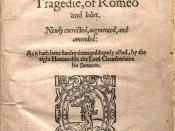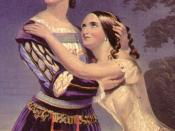Fred D'Aguiar's novel "The Longest Memory" is filled with much intolerance and narrow-mindedness combined with mockery and paradoxes. Despite this, the novel still presents a clear moral vision that slavery is evil and inhumane. This is achieved through the characterisation of heroes, villains and victims in addition to the blossoming of a beautiful but tragic love story amongst bitterness and hatred.
The opening chapter is from the point of view of Whitechapel, an elderly Negro slave who works on a plantation run by a Mr Whitechapel. When Whitechapel's wife dies, his son, Chapel, decides to run away. The reader can clearly see that the old slave is sincerely torn between doing the right thing by his son and upholding his responsibility to his master. In the end, the wise Whitechapel decides to alert his master to the whereabouts of the runaway slave boy, rather than to "abandon him to the horrible fate he might bring on himself".
When the boy is caught, the overseer of the plantation orders a punishment of 200 lashes, which results in the death of the slave boy.
Despite the good intentions of Whitechapel, many of his fellow slaves loose their respect for him. This, combined with the memory of his son's death, causes Whitechapel to be tormented greatly and eventually results in him giving up his name in an attempt to "live without being hurt by life". These events portray Whitechapel's situation and highlight the sensitivity and kindness of this slave. As a result, the reader is able to identify with Whitechapel and relate to his story and the predicament of his fellow slaves. Whitechapel is in effect, one of the heroes of the play due to his loyalty and vision.
In contrast, the overseer of Mr Whitechapel's plantation - Sanders -...


